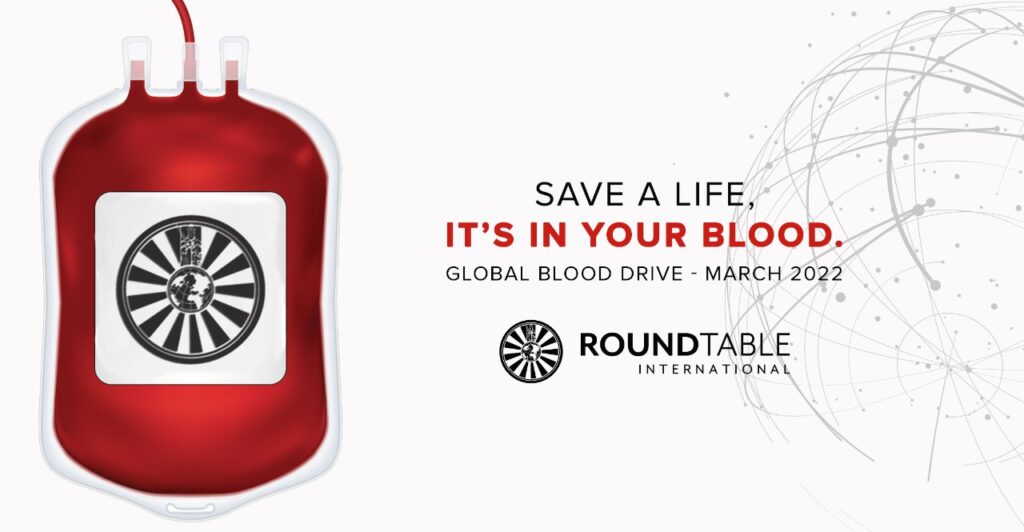The Round Table International board would like to dedicate the month of March towards creating awareness on the global shortage of blood. This project would also serve as a focus on our health pillar and is aligned with our 5 pillars for community service. We felt the importance of blood and the global shortage thereof is something that affects all of us irrespective of age or gender. That is why we felt to roll out this GLOBAL BLOOD DRIVE to all family members of the RTI family.
As we celebrate RTI Day on the 14th of March we would like all RTI family members and friends to support our Global Blood Drive as our initiative of the year.
Facts surrounding the Global shortage:
The newest research revealed that the global supply of blood for use in life-saving transfusions is insufficient to keep up with global demand, leaving most countries exposed to critical shortages. The first detailed analysis on the global supply and demand of blood has found 119 out of 195 countries do not have enough in their banks to meet hospital needs.
Those nations, which include every country in central, eastern, and western sub-Saharan Africa, Oceania (not including Australasia), and South Asia, are missing roughly 102,359,632 units of blood, according to World Health Organization (WHO) goals. Blood transfusions are a pillar of modern medicine that saves millions of lives every year. But in low- and middle-income countries, many hospital patients do not have access to a timely and safe supply.
Around the world, over 100 million units of blood are donated annually, and yet 42 percent of that is collected in high-income countries, which include less than 16 percent of the world’s population.
Other studies have focused on blood safety, such as the risk of transmitting infections such as HIV, Hepatitis B, and C. Without safe blood, diseases spread like wildfire. Based on a survey done by the World Health Organization, “20 countries in the world do not have 100% screening for HIV and 24 do not have 100% screening for hepatitis B, 37 for hepatitis C and 24 for syphilis.”
After reading these shocking statistics published by the World Health Organization it is evident that we need to do something. Shaun Brennan once said after donating for the 500th time: “I’m just one person and have been able to contribute what I have. But no matter what I do individually, it’s not nearly as powerful as what we could do collectively,”
We also thought it wise to share some light on the different types of donations with a short
description of each.
Types of DONATIONS
Whole Blood Donations
Donating a unit of blood for a patient. This unit of blood can be processed into 3 components
namely red cells, platelets, and plasma. The components are used to save 3 lives. This process
takes approximately 30 minutes in total.
Platelets Donations
Platelets play a vital role in blood clotting and the prevention of excess blood loss. The blood is
processed through a cell separator, which retains the platelets and returns the other blood
components to the donor’s system. This procedure enables people to donate platelets every
month. Platelet donation is a simple process that takes about an hour and a half to complete.
Plasma Donations
Plasma donation is a similar process to platelet donation and takes about 90 minutes. The blood
is processed through a cell separating machine that filters out the plasma and returns the red
cells and other cellular components to the donor’s system. Plasma can be donated every 2
weeks where possible.
Autologous Donations
Other specialized donations include Autologous donation where you donate blood for yourself
before a pre-planned surgery and designated donation where your family and friends donate
blood for you. Please contact the call center for more information as this is a specialized
donation.
Summary:
We as the RTI Board would like to encourage each and every RTI family member to get creative
with this project. Whether you donate yourself or encourage others to do so as long as we
donate. Set up challenges. Challenges include within your club or association. Challenges
between associations. I’ve seen projects like:’ A pin for a pint.’ Where participants get a blood
drive supporters pin they can wear with pride to show that they have donated. I’ve even seen
“pint for a pint” where a pint of blood is exchanged for a pint of beer. Please post and share
while creating awareness of this life-saving initiative.
Yours in international table
Paul Dippenaar
Round Table International CSO
2021/2022



